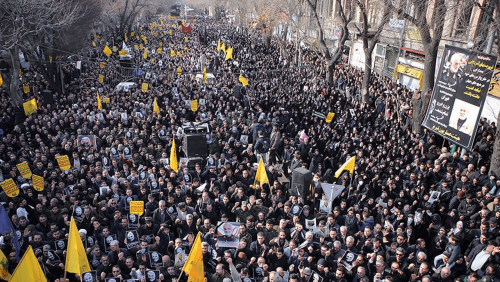Global Cities Respond as US-Iran Relations Intensify

Following the drone attack that killed Qassim Suleimani, cities across the US intensified local security measures—representing the new era of global affairs.
US-Iran Relations Intensify
On January 3, the United States carried out a drone attack near the Baghdad International Airport that killed one of Iran’s most influential security and intelligence commanders and longtime leader of its Revolutionary Guards’ Quds Force, Major General Qassim Suleimani, along with other senior figures in Iran-backed militias. The attack drastically intensified the tensions between the United States and Iran.
As unexpected as this event was, in the world of inter-state hostile relations, this type of strategic state behavior (i.e.& targeted killings or strategic assassinations) is not unprecedented. We have seen similar operations many times throughout the postwar period.
What was notable and particularly surprising, however, was how global cities responded to the escalation of the US-Iranian conflict in the immediate aftermath of the attack. In a historical context, this represents the new era of global affairs, where the future of cities is inextricably linked to what is happening in the world. And mayors are taking note.
Across the US, media immediately reported on city actions and official statements about ramped up security of local and city officials from all over the country. Major cities quickly mobilized around four specific strategies.
First, as The Los Angeles Times, ABC News, NBC , and FOX5 reported, cities across the US intensified local security measures. It was reported, for example, that New York Mayor Bill de Blasio along with top officials in the city were moving to determine what immediate steps the New York Police Department would need to take to protect key locations “from any attempt by Iran or its terrorist allies to retaliate against America.” Even international media, such as The Guardian, reported how cities across the US were stepping up security after the strike on Iran.
Second, cities increased protocols and communications to monitor the situation. The Mayor of Washington, DC, for example, was quoted stating that "while there are no immediate threats to the District of Columbia, we remain vigilant and MPD & HSEMA will remain in close contact with regional and federal partners to monitor evolving events—both at home and abroad.” The Los Angeles Police Department said it was monitoring developments in Iran, and the Seattle Police Chief, Carmen Best, tweeted that her department was “closely tracking” developments concerning Suleimani’s assassination.
Third, mayors and local police departments in cities throughout the US were quick to put out public statements and reporting on how they were responding. For example, in Boston, the Police Department said it would increase patrols due to the US attack in Iran. New York City Mayor De Blasio held a press conference where he stated that due to the attack in Iran “we are now potentially facing a threat that’s different and greater than anything we’ve faced previously.” He also tweeted that “no one has to be reminded that New York City is the number one terror target in the United States. We're taking escalation in the Middle East seriously — and I have absolute faith in the NYPD to protect this city and keep every New Yorker safe.”
And lastly, many cities reassured their local Iranian-American immigrant communities that they continued to be welcomed in their cities and that tensions at the nation-state level need not influence dynamics at the local level. In New York City, for example, the Commissioner for Immigrant Affairs, Bitta Mostofi, an Iranian-American herself, spoke at a public rally in Manhattan to “ensure Iranian New Yorkers know their city stands with them.” She also shared links to “Know Your Rights” when traveling into the city from abroad given increased security at airports and border crossings.
The fact that domestic and international media found it relevant to report on what security measures city mayors and local police departments took in the wake of the American drone attack against an Iranian target is a loud and clear signal that something is fundamentally different today compared to previous eras. This type of coverage would have seemed unthinkable in the context of the Cold War, but now it appears to be completely normal and expected. Indeed, since the creation of the US Department of Homeland Security, a lot of the responsibility for counterterrorism has been put on the local level in US cities. In the post 9/11 era, cities have been seen as the absolute frontier to the global war on terrorism.
Yet the US-Iranian conflict is not about any nonstate terrorist organization: it is a classic, traditional inter-state conflict led by heads of countries and the military. The response of cities magnified that they are emerging as new strategic actors in national and international security, conscientious of what is happening in the world and how it affects them. Global cities have a role to play in global affairs, and global city mayors are increasingly stepping up to this new world order.
Indeed, it seems clear that in order to stay relevant, safe, and purposeful, cities need to not only fix potholes and upgrade LED lights, but to follow, be vigilant, and be mindful of what the president, the military, and the country are doing overseas. The future of cities depends on it.

